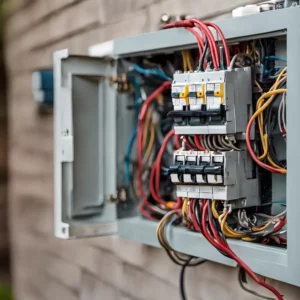
Electrical issues in your home aren’t always obvious, but ignoring them can lead to serious safety risks. Recognizing the signs of electrical wiring problems early — such as flickering lights, strange odors, or frequently tripped breakers — can help prevent fires, equipment damage, and costly repairs. At Brandon Electric, we specialize in helping Tampa homeowners identify these hidden hazards before they become emergencies.
In this article, we’ll break down the most common warning signs and what they might mean for your home’s electrical system. Knowing what to watch for is the first step toward a safer, more reliable home.
Table of Contents
Your home's electrical system is like its nervous system – responsible for powering everything from lights and appliances. Over time, wear and tear, improper installation, and even rodents can cause issues within the wiring. Identifying these signs early on can save you from potential dangers and costly repairs down the line.
Have you noticed your lights flickering or your outlets dimming when you plug in appliances? This could indicate a problem in your electrical circuit. While occasional flickering can happen with large appliances starting up, persistent flickering or dimming lights may indicate loose wiring, overloaded circuits, or faulty connections.
NFPA reports faulty wiring as one of the top three causes of residential fires.
If you catch a whiff of burning plastic or notice sparks when using outlets or switches, it's a definite red flag. These could be signs of damaged wires or faulty components. According to the U.S. Fire Administration (USFA), wiring issues account for over 24,000 electrical fires annually.
Unplug all devices and contact an electrician immediately if you smell burning.
A tripped circuit breaker once in a while is normal, but frequent tripping could mean trouble. This indicates that your circuit is drawing more power than it should, which could be caused by damaged wiring. Brandon Electric can help determine if the issue lies within your wiring or if you need to redistribute your electrical load.
Your electrical outlets and switches should be silent operators. If you hear a persistent buzzing sound, it might be due to loose wiring or faulty components. Ignoring this could lead to overheating and potentially dangerous situations. Reach out to Brandon Electric to investigate the source of the buzzing.
When you touch an outlet or switch and it feels excessively hot, it's a sign that something isn't right. Heat buildup is often linked to faulty wiring or overloading. Continuing to use these outlets can be hazardous, so it's essential to get them inspected and repaired promptly.
At Brandon Electric, we're proud to serve Tampa, Ellenton, South Tampa, Carrollwood, Wesley Chapel, Lutz, Brandon, Dade City, and neighboring locations with top-notch electrical services. Our experienced team understands the unique needs of Florida homeowners and is dedicated to ensuring your safety and comfort.
Remember, your home's electrical system deserves attention just like any other aspect of your life. Don't overlook the signs that something might be amiss. If you notice any of these indicators – flickering lights, burning odors, tripped breakers, buzzing sounds, or hot outlets – it's time to reach out to Brandon Electric. Our expert team will diagnose the issue, provide effective solutions, and restore your peace of mind.
Reach out to Brandon Electric online today or call now to schedule an inspection and keep your Tampa home free from electrical wiring worries.
How often should I have my home’s wiring inspected?
The Electrical Safety Foundation International (ESFI) recommends a professional inspection every 10 years for a homeowner-occupied home and every 5 years for rental properties or older homes.
Is it safe to fix minor electrical issues myself?
No. Even minor electrical repairs carry risks of shock, injury, or creating hidden hazards. Always hire a licensed electrician for wiring issues.
What are the most common causes of electrical wiring problems?
Common causes include aging wires, DIY wiring mistakes, overloading circuits, rodent damage, and exposure to moisture or heat.
How can I prevent electrical fires in my home?
Schedule regular electrical inspections, avoid overloading outlets, replace damaged cords, and install Arc Fault Circuit Interrupters (AFCIs) and Ground Fault Circuit Interrupters (GFCIs) where required.